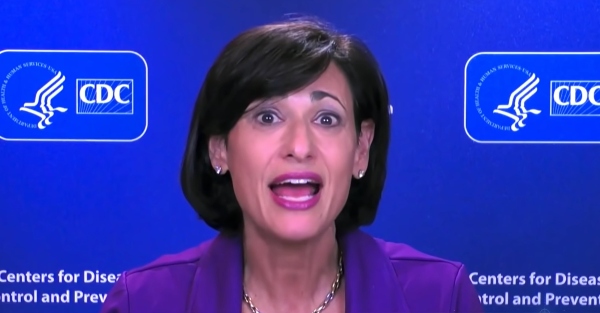 Parler
Parler Gab
Gab
- Former CDC Director Rochelle Walensky is urging for an additional MMR dose for infants aged 6-11 months in high-risk areas.
- Even the biggest vaccine pushers do not recommend the MMR vaccine before one year of age, due to safety concerns.
- The push for an extra MMR dose comes despite a lack of safety data for administering the vaccine to young babies.
- A suspected measles case in Arizona was determined to be a rare reaction to the MMR vaccine, not an actual measles infection.
- Concerns are raised about the potential risks of annual MMR boosters, including serious adverse events and the mischaracterization of vaccine reactions as measles cases.
The push for an extra MMR dose
Former Centers for Disease Control and Prevention (CDC) Director Rochelle Walensky called for an additional MMR dose for infants aged 6-11 months, particularly in areas experiencing measles outbreaks. Walensky and her colleagues have argued in op-eds published in the Journal of the American Medical Association (JAMA) and STAT News that the current immunization guidelines should be revised. They propose that infants traveling to regions with a higher probability of measles exposure, whether domestically or internationally, should receive an extra MMR dose between the ages of 6-11 months. This recommendation is based on the uptick in measles cases in the United States. Several infectious disease experts, including Dr. Mary Caserta, a pediatric infectious disease specialist at the University of Rochester Medical Center, agree with Walensky's proposal. Caserta stated, "If we have data showing that there’s an increased risk of measles in the United States, I’m definitely in favor of reviewing our immunization guidelines to see what we can do to best protect our children." However, the push for an additional MMR dose for young babies raises significant concerns, particularly regarding the lack of safety data. Heather Ray, a science and research analyst with Children’s Health Defense (CHD), pointed out that "many people assume the MMR vaccine is safer than the measles, mumps and rubella infections," but there are "serious red flags regarding the safety and research behind the vaccine."Safety concerns and adverse events
The MMR vaccine has been associated with a range of adverse events, including febrile seizures, anaphylaxis, meningitis, encephalitis, thrombocytopenia, arthralgia, and vasculitis. According to documents released by Physicians for Informed Consent, the risk of permanent disability or death from the MMR vaccine may be greater than the risk posed by the diseases it aims to prevent. This is due to the fact that vaccine safety studies have not been conducted on a large enough scale. Ray highlighted that the risk of serious adverse events following MMR vaccination is "concerning" and noted that "only a small percentage" of these events are reported in the Vaccine Adverse Event Reporting System (VAERS). As of the end of January, there have been 41 deaths reported in VAERS following MMR or MMRV vaccination since 2015. In fact, Walensky's recommendation comes on the heels of a suspected measles case in a 1-year-old child from Pima County, Arizona, that was revealed to be a reaction to the measles-mumps-rubella (MMR) vaccine, not an actual case of measles. This "rare" reaction would likely become more commonplace if MMR vaccines were given to infants younger than one year of age, as this has never been recommended due to the vaccine's risk of adverse events in babies with underdeveloped immune systems and low blood volume/body weight.The mischaracterization of vaccine reactions
The case in Arizona highlights a troubling trend: the mischaracterization of vaccine reactions as measles cases. The Pima County Health Department acknowledged that reactions to the MMR vaccine are "rare and do not carry the same risk as community-acquired measles." However, the lack of clarity on the toddler's symptoms and the precautionary measures taken by health authorities suggest a potential overreaction to vaccine reactions. Karl Jablonowski, a senior research scientist with CHD, criticized the CDC's childhood vaccine schedule as "aggressive — some would find it reckless." He emphasized that the recommendation against administering the live-virus MMR vaccine before 12 months of age is not a coincidence. "MMR is not recommended for younger than 12 months old because even the vaccine-zealous recommenders do not find the risks appropriate," Jablonowski said. Walensky acknowledged that implementing a third MMR dose would incur costs but argued that it "can be cost-effective compared with the resources required to treat infections and contain outbreaks." However, Jablonowski countered that this approach is a "knee-jerk reaction to fear" and that "the manufacturing of fear is a multi-billion-dollar-a-year industry." Dr. Peter Kasson, a professor at the Georgia Institute of Technology, emphasized the severity of measles, stating that it can "ravage the immune system and brain, causing long-term damage." While measles is indeed highly contagious, David Speicher, a molecular virologist and epidemiologist at the University of Guelph, noted that "the risk of getting that severe disease is low and the risk of transmitting or getting infected in a population where most of the population is immunized for measles is also extremely low." As the debate over the necessity of an additional MMR dose for young babies continues, it is crucial to weigh the potential benefits against the risks. The case in Arizona serves as a reminder that vaccine reactions can be mistaken for actual infections, raising questions about the accuracy of diagnoses and the precautionary measures taken. Sources include: ChildrensHealthDefense.org CDC.gov ChildrensHealthDefense.orgMajor shakeup at HHS: Top officials placed on leave amid mass restructuring
By Laura Harris // Share
Hospital staffers sound alarm after 10 nurses were diagnosed with BRAIN TUMORS
By Ava Grace // Share
Study reveals social media’s stealthy role in the childhood OBESITY crisis
By Ava Grace // Share
Criminal referral requests filed against Fauci and top COVID officials in seven states
By Willow Tohi // Share
Governments continue to obscure COVID-19 vaccine data amid rising concerns over excess deaths
By patricklewis // Share
Tech giant Microsoft backs EXTINCTION with its support of carbon capture programs
By ramontomeydw // Share
Germany to resume arms exports to Israel despite repeated ceasefire violations
By isabelle // Share










